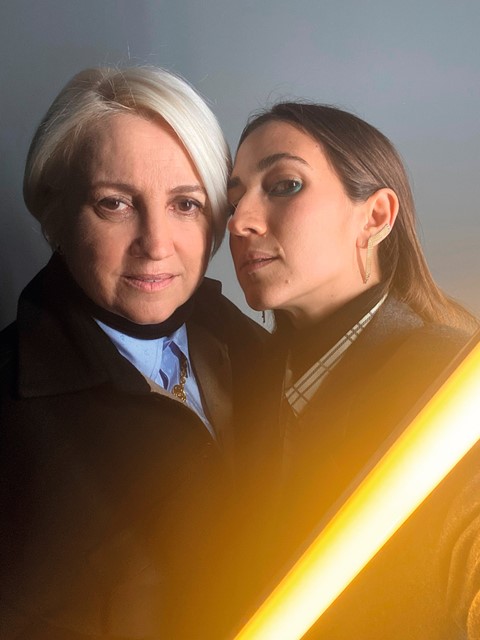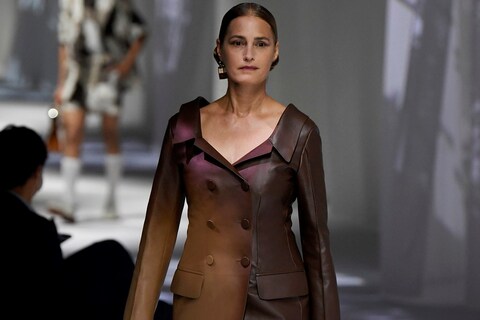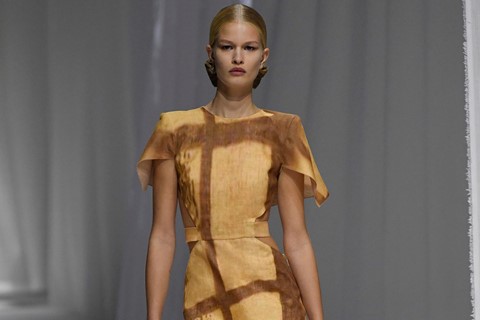This article is taken from the Spring/Summer 2021 issue of AnOther Magazine. To celebrate our 20th anniversary, we are making the issue free and available digitally for a limited time only to all our readers wherever you are in the world. Sign up here.
“Ciao, mamma.” Delfina Delettrez Fendi and her mother, Silvia Venturini Fendi, are in different parts of Rome, I’m peering at them both on a screen in London. Past, present, future ... is there anyone in fashion better equipped to talk about that trinity than a Fendi? Delfina is fourth generation, after all. But despite the weight of heritage, Fendi is the least predictable of the big luxury brands. For that, credit is due to Silvia, daughter of Anna, the second born of the formidable five Fendi sisters who transformed the family business, not least by hiring Karl Lagerfeld as creative director in 1965.
Silvia originally fled any sense of familial obligation and made jewellery on a beach in Brazil for a time. Maybe that helped her settle with her Fendi past. There’s a word that Delfina, now also a jeweller of international renown, uses when she talks about her own passage through the Fendi legacy: errare, meaning not only “to make a mistake” but also “to wander”. So Silvia wandered, before returning to Rome to wrestle the albatross of legacy to the ground. And, for at least the past few decades, she has been responsible for infusing the brand with what she and I agree has always been a winningly perverse spirit, with Lagerfeld as an equally winning sinner.
Now he is no longer with us, and Silvia has repositioned Fendi for the future by taking on Kim Jones to fill his size 40s. Since Jones graduated from Central Saint Martins almost 20 years ago, he has built a substantial reputation on moving menswear’s goalposts, so his appointment as artistic director of the label’s haute couture and ready-to-wear for women was a bold move for him, and for Fendi. But typical, too. Like Fendi’s new factory, in a valley in Tuscany, built with attention to the environment, so that it sits almost transparent among the greenery. And like Fendi’s Hand in Hand initiative, which was launched for Autumn/Winter 2020 to help preserve the artisanship of small, mostly family-run businesses all over Italy by inviting them to reconceptualise the Baguette, Silvia’s accessory brainwave that arguably birthed the It-bag phenomenon in 1997.
Family. Silvia felt Kim fitted. Her last show before he started was in September, in front of a necessarily small physical audience, and a huge virtual audience. The invitation was a box (fashion fell in love with boxes in 2020) containing a sheaf of family photos by Delfina’s partner, Nico Vascellari, a couple of boxes of pasta and Nonna’s lemon pesto recipe. The actual invitation itself was sheathed in embroidered white linen created by the house’s artisans. If it suggested that Fendi’s future is more about family than ever, I thought it also broadened the concept of what that family means in a fashion world turned on its head. Silvia thought so too.
Silvia Venturini Fendi: The family is becoming larger – it was the last show before receiving Kim, so I really wanted to show him the big picture. It was a moment when I thought deeply about what Fendi was and what Fendi could be. I wanted to talk not only about the company, but also about the values and the people who are part of the company.
Tim Blanks: With Miuccia’s last show before Raf came on board, she wanted to create a blank slate, a ground zero for Prada. Did you feel like that?
SVF: I think it was this idea of purity, whiteness, simple things. I wanted to be very clear, very precise, not only to talk about clothes but to talk about people. That’s why I asked my mother [Anna] to be there. From the day she left the company, she has kept very much to herself, no interviews, nothing. I said I would be so happy for her to be part of it. It was like a welcome mat
TB: When we talked during the first lockdown, you’d made a bubble with your whole family at home in Rome, and there was a novelty, a joy even. I thought that came through in the show. Sweetness, poignancy, even nostalgia.
SVF: Now it is the only real thing we have – how do you say punta ferma in English? Our world is becoming very, very small and somehow we have to find our presence amid this. So it was this message of looking at the world outside – from the inside. Let’s be honest, our world used to be the opposite, projected outwards with all the travelling and the meetings. And now here was a little moment where you could have introspection and thoughts about love and values. The collection showed this, looking at the outside world like it was very much something from the past.
TB: I never think of you as being a nostalgic person.
SVF: When you get older, you start looking back ...
Delfina Delettrez Fendi: [Interrupts in mock exasperation.] Oh, Mamma!
SVF: Maybe I feel weaker because I’ve entered this range of people who are in danger, darling [Silvia was 60 last August]. I’m the oldest in the family and I say, “Please don’t come too close to me.” It’s true, today I’m more conscious about my health and my age.
DDF: Look at your mother, it’s not a question of age!
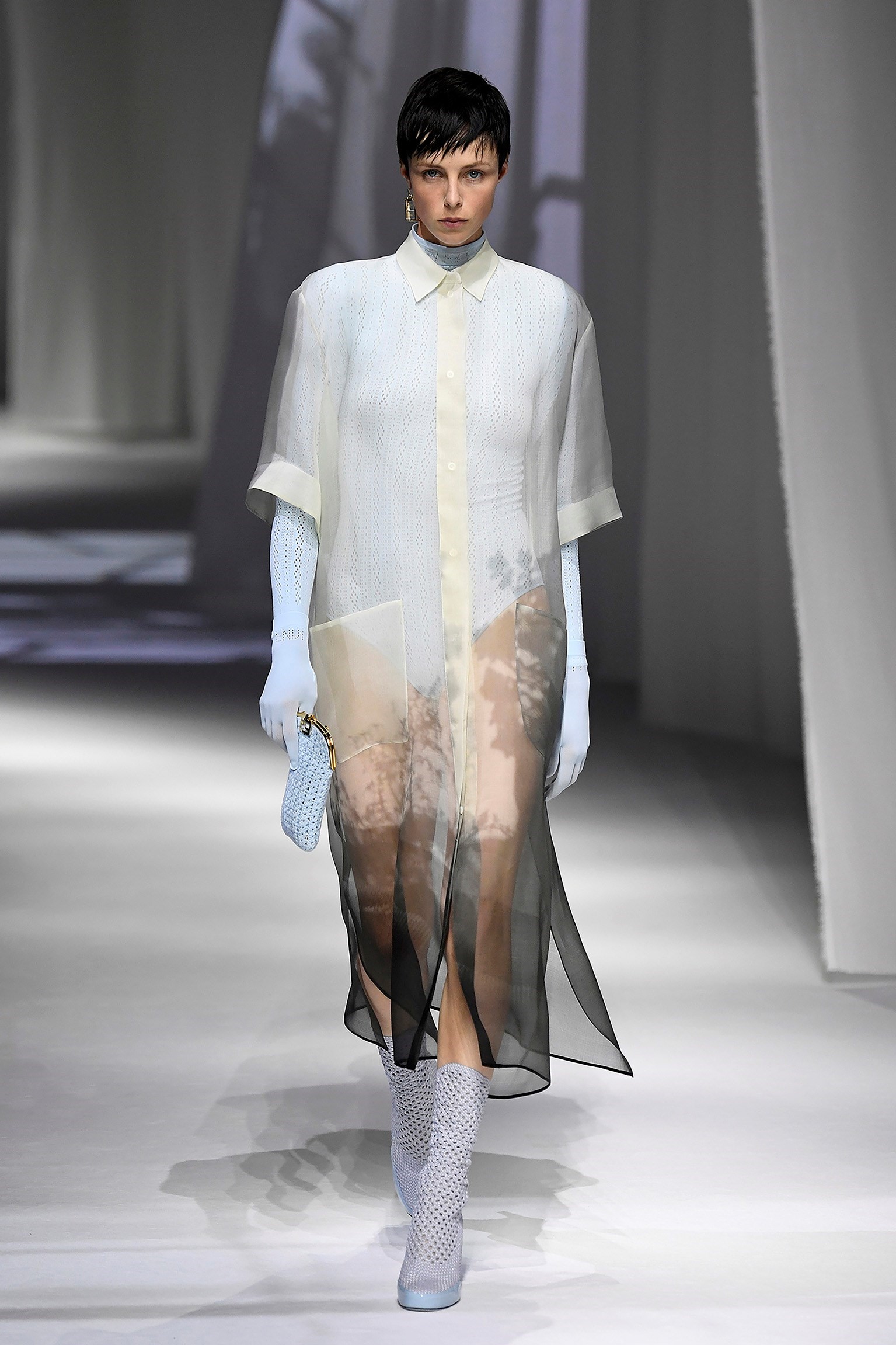
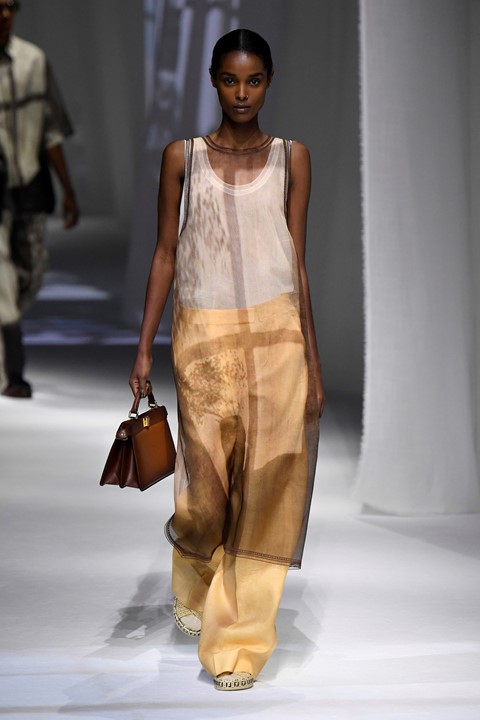
TB: Delfina, did you see Silvia changing this year?
DDF: Well, yes – in good and bad ways. I think she’s a bit of a hypochondriac, but this situation helped her let it go. She’s a control freak. [To her mother.] I always tell you to be less in control, to let it go.
SVF: So you won’t laugh any more when I’m sitting at home in my mask all day?
DDF: She forgets to take off her mask for hours.
SVF: I’m so used to it now – it’s quite practical to hide yourself. I like the perverse aspect of my mask. But with this show, I probably showed more of myself than ever before, the most hidden aspects of my personality. I really wanted to give emotion to the audience, which was so difficult without them actually being there.
TB: Have you let yourself be more vulnerable?
SVF: Yes. I think it’s a reaction to living without contact. At the end, we will want to show our real side.
DDF: You could see that clearly in the collection, because there was a sense of going back to reality, to real clothes, to family textiles and materials, like the corredo [trousseau].
TB: It always comes back to family. I’m curious about the relationship between grandmothers and grandchildren. Do you see Silvia through different eyes when she’s with your twins? There’s less pressure, she doesn’t have to be the disciplinarian.
DDF: She really lets her guard down.
“Karl was here for 54 years, you couldn’t even think of changing. I always thought, ‘Oh my God, what is going to happen afterwards?’ The future looked so difficult for me. And today I’m so confident and happy. I think the seeds here are so fertile” – Silvia Venturini Fendi
SVF: I’m not a disciplinarian, I’m the opposite with them.
DDF: With the grandsons, yes, but with us, you still have this matriarchal attitude, even though I’m a mother now and have three children. Sometimes, I’m like, “Mum, come on, I may be your daughter but I’m a mother also,” and we have this little fight. I think it’s the most difficult aspect of becoming a parent, but I think it’s the most important thing too, to let go, to give total freedom.
SVF: I left a lot of freedom to you and your sister.
DDF: You never pushed us to do anything, you always kept the door open somehow and you let us follow our natural attraction to things. This was the best gift you gave us. You were there, but you were never on us.
TB: I’m curious about what happens when it’s your mother who is the bad girl, the runaway child, like Silvia was.
SVF: To escape my destiny ...
TB: Do you think you’ve inherited that streak from her, Delfina?
DDF: I had rebellious moments in my spirit and in my aesthetic. Becoming a mother when I was 19 was a rebellious way of saying, “I’m not a daughter, I’m a mother now.” But I couldn’t be rebellious in my everyday life, so I had to do it in my work. It’s often said that in order to break the rules you have to know them. It was the opposite for me – I didn’t know the rules, so I broke them. But the true rebel was always Mum – you see her now, very strict and controlling, but you could write a book on her [rebellions].
My brother and I grew up totally convinced that our parents were married. We’d look at all the pictures of the wedding and be like, “Oh wow, it was so romantic and beautiful.” But it was a mise en scène – she admitted it when we became parents because she didn’t want us to emulate her. And more stories like that are coming out now.
TB: So Silvia wasn’t actually married.
DDF: And I’m actually not her daughter [Laughs.].
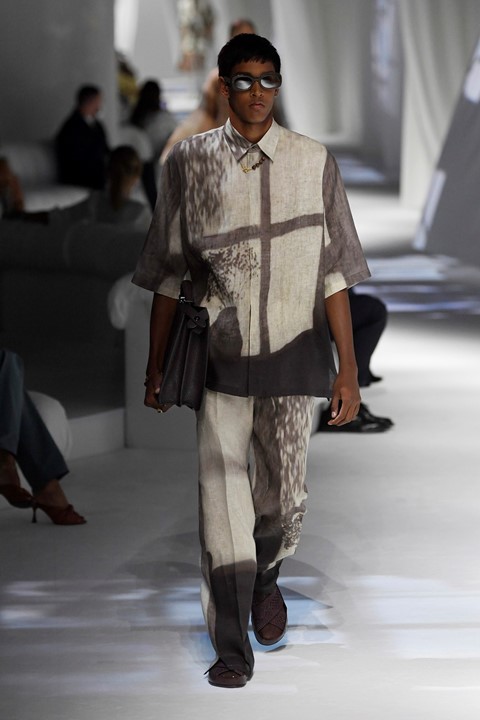
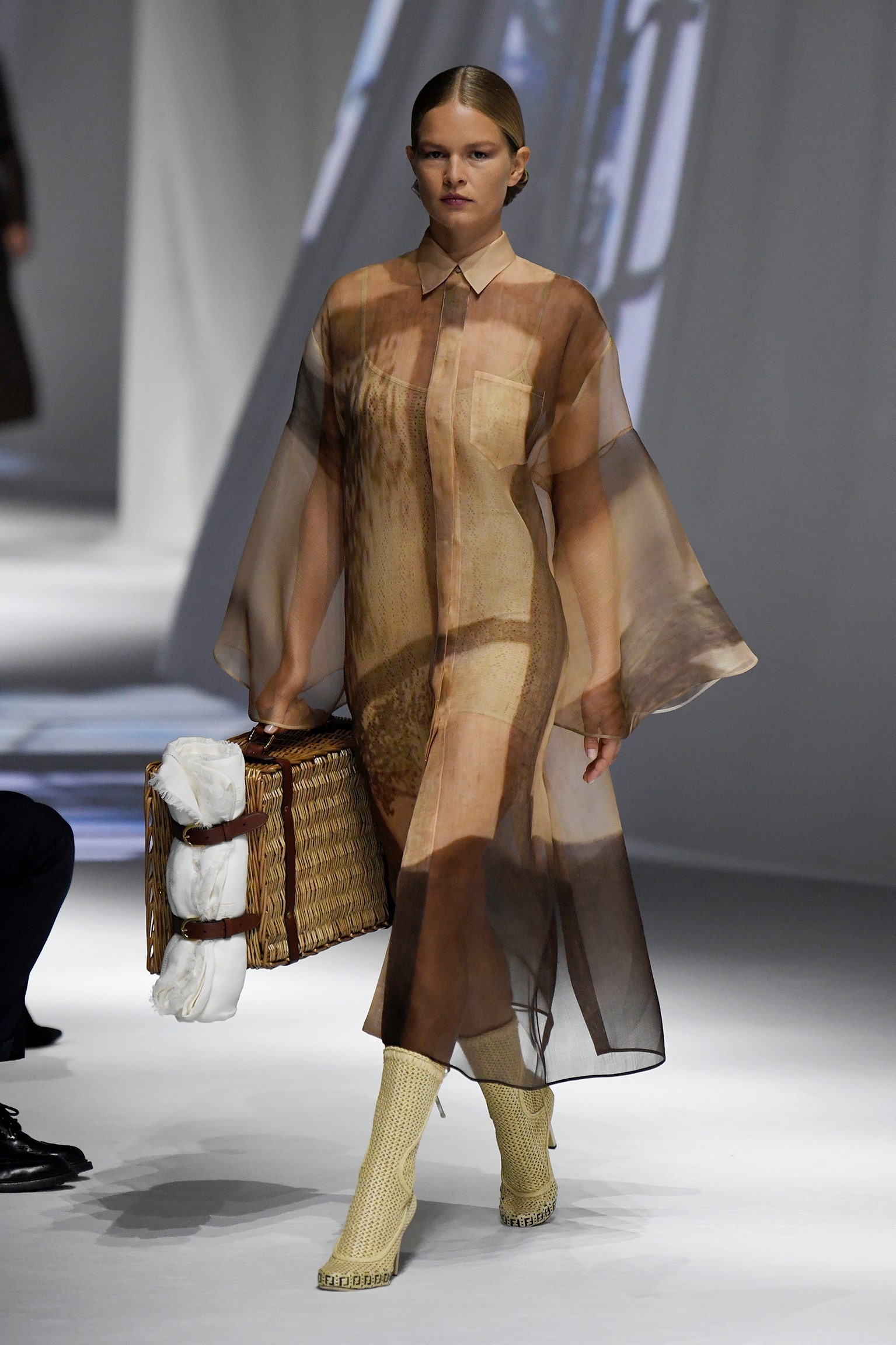
SVF: It’s true, I never got married. I like to feel free always, and maybe I don’t use this freedom, because in the end, let’s be honest, I didn’t do anything so tremendous. But it’s difficult for me to have contracts and to say, “Oh yes, I will do that,” because the moment I do, I start thinking I want my door to be open so I can change my mind, even if I never do change my mind and I’m more predictable than other people. So the “marriage” was a way to say, “I’m very honest and I couldn’t say I will be with you for ever, so I don’t see why I have to sign a contract.” But my family thought it was too much for me to be so liberal and they asked me to get married and I said I would if they really wanted me to but it had to be fake. So we never had an actual ceremony, we just told people it was very closed and invited them to the party afterwards. Three days of parties, actually.
You know, at the age of 60, I still ask myself what I will do when I grow up. I like to think I have many possibilities, but in the end I’m more traditional than the others. I don’t do anything so special, I just work every day and I’m a very nice grandmother. But maybe one day I will go and live in a tropical city.
TB: You told me once you wanted to be a scientist.
SVF: Not so much any more. I would like to have been an astronaut. The more I think about it, that is something I would have done with pleasure.
TB: Delfina, is there anything Silvia could say that would shock you?
DDF: I don’t think we can shock each other. We’ve heard so many different stories from so many different generations.
SVF: What I try to have for my children is for them to be open to change. I always said you can be here today and the next day life can change so much. Never say never and never say always. Take nothing for granted. This is probably because I lost my father when I was 15. He was 43, a very healthy man, and he died in front of me from a heart attack. My life, which was so beautiful and so happy, became a horror movie. I was so desperate. Delfina calls me a hypochondriac and a control freak, but I’ve always lived with this sense that things are not for ever. I’m never sure of things. It’s a reaction to what I experienced that day.
TB: So you live in a state of constant anxiety?
SVF: More than anxiety. I lived with a sense of catastrophe close to me, and I still have it. Sometimes Delfina tells me, “My son won’t sleep tonight,” and I start checking everything. When I pack, I pack everything I need, as if I were going to the moon. When the children were little and we didn’t have mobile phones, I bought them these little collars from a pet shop with my name and phone number on in case they got lost.
DDF: Very nice! I was sleeping with that necklace.
“I think you have to be left free to decide and get passionate about what the family is doing and develop your own understanding if you want to continue this family story. I think Fendi can be a heavy ghost. But it’s a great honour” – Delfina Delettrez Fendi
TB: How does living with a parent with an impending sense of doom rub off on you?
DDF: You have to become smarter and, in order to make her not worry so much, you have to become ...
SVF: [Laughs.] ... a liar!
DDF: A rebel – in a smart way, a curious way.
TB: Delfina, you’re fourth generation. I’m always wondering about fashion dynasties. Is it a blessing or a curse to be a Fendi?
DDF: Both, depending on the situation.
SVF: If you have to book a restaurant, it’s a blessing.
DDF: There isn’t a worse nightmare than living someone else’s dream. I think you have to be left free to decide and get passionate about what the family is doing and develop your own understanding if you want to continue this family story. I think Fendi can be a heavy ghost. But it’s a great honour. I went to the best school. I couldn’t ask for anything more.
SVF: I agree with Delfina when she says it’s both. I can look back and it was a blessing not just because I bear the name of the company but because I made this incredible journey with incredible people who made me who I am. I’m not saying I’m incredible, but I’m satisfied with who I am, and with the result before my eyes, which is my children.
TB: And now you’re both taking Fendi into the future in your own ways.
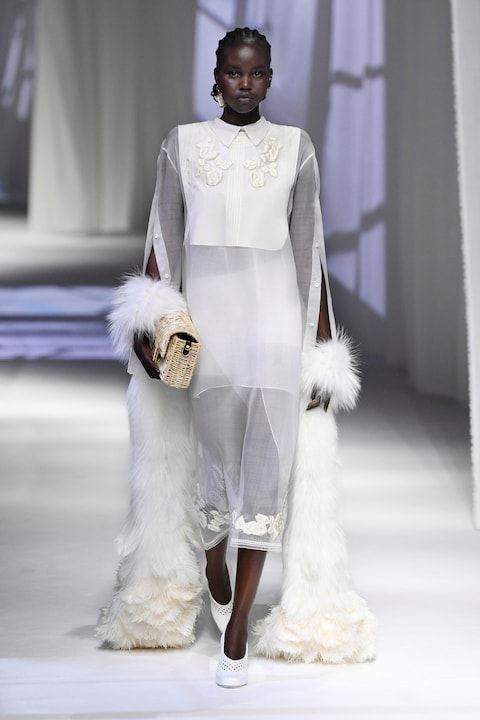
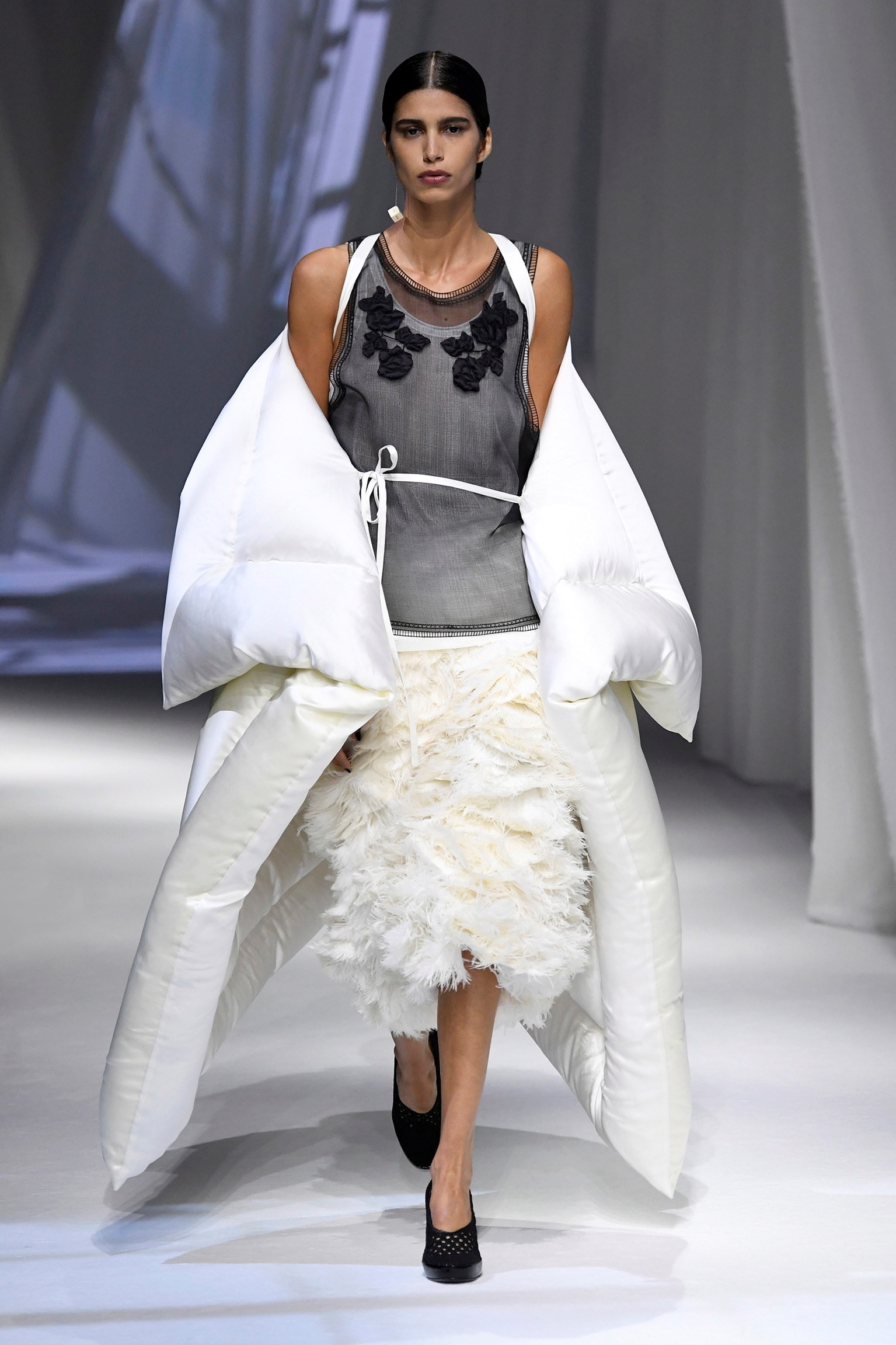
SVF: I’m so happy because I’m more complete now. It’s like the same new story all over again. I’m used to confrontation, I missed sharing it with a man. It’s three months since Kim and I have been working together and I’m experiencing things that I’ve been missing for a few years.
TB: What is it about the male energy you feel you need?
SVF: I like the different point of view. I like to see the woman through a male eye to understand her more. I did the pre-collection by myself and it probably expressed that in a clear way, but we were dealing with a world that is so complex. So I like the idea that there are different voices. And I think there is nothing better than to work with different genders. It’s interesting because it completes the picture.
TB: Kim comes from menswear and Karl came from couture, so presumably their points of view are very different. How does that affect the way you’re seeing things?
SVF: I like to look at something to see if I find Fendi in it, but Fendi is stronger than anything because you can always find it, even if there’s another person at the end of it – especially because Kim, like Karl, is a designer who likes to build from what there is. This is a way of respecting what Fendi is and I love that. Karl did it at Fendi and at Chanel. He found a history that he respected and evolved it. Kim is doing the same thing here. It sounds so obvious but I like to find my roots in the new things I see – it gives me this exciting feeling of timelessness. Karl was here for 54 years, you couldn’t even think of changing. I always thought, “Oh my God, what is going to happen afterwards?” The future looked so difficult for me. And today I’m so confident and happy. I think the seeds here are so fertile.
TB: Still, I imagine you must be under quite a lot of pressure. When you look at Delfina, do you ever wish you were doing [what she is doing]?
SVF: Sometimes, of course. But I also know that Delfina says, “I wish I was doing what she does.”
DDF: It depends [Laughs.]. But having a small company lets you be in control of everything. You can be 100 per cent faithful to your vision.
TB: Could you imagine a time after Silvia goes off to be an astronaut when you would step into the role of Fendi matriarch?
DDF: If they are high-heeled shoes, maybe. Never say never.
“I’ve always been too rebellious for this, but I think the family motto “Nothing is impossible” really suits me. If you believe in something, you have to fight and you will probably get what you want. I feel like a lion when I fight for an idea for me or for someone I love” – Silvia Venturini Fendi
TB: She’s going to be watching you from outer space.
SVF: It’s different now. What I like is that the Fendi spirit is about family for sure, but it cannot be just that. First of all, Fendi is today owned by LVMH. It’s not under my control. Fendi is a brand that has many other – how do you say? – assets. Maybe it doesn’t come down to having a Fendi family member here for all our lives to be successful.
TB: What’s the best piece of advice you’ve ever been given?
SVF: I’ve always been too rebellious for this, but I think the family motto “Nothing is impossible” really suits me. If you believe in something, you have to fight and you will probably get what you want. I feel like a lion when I fight for an idea for me or for someone I love.
DDF: I would say, “To always be ready to reconsider things from different angles.” It doesn’t matter if it’s ugly or pretty, Karl would say. He was kind of an immortal presence in our family. Like the brother of the five sisters.
SVF: It was the same with me. It’s like the first memory of your aunt. He was always there. At the beginning I didn’t understand what he was doing. He was always there, a part of the family.
TB: And yet after he died, with those three collections you did on your own, I felt there was a freedom. You were like a bird who had been released.
SVF: It’s true. I also touched issues that were always forbidden. He didn’t like animal prints or heavy floral prints, and I did them. I thought, “OK, let’s explore things and see if I can break those heavy rules that I never actually understood.” I think I took some freedom.
TB: So you rebelled again?
SVF: Yes, but always in a delicate way. Every day, you jump from a heel to a pant to a bag, to a seam on a dress, and you always have to give the right answer, and sometimes I say, “Oh my God, I don’t know.” And when I’m at that point, I ask myself, “How would Karl answer?” And that helps me.
TB: Do you think you’re at a funny point now, where you’re kind of the Karl and Kim is the Silvia?
SVF: [Laughs.] I don’t think so. I don’t think of myself as Karl at all. It’s a very different kind of relationship. I’m still Silvia ... but maybe Kim is Karl.
***
We talk for a while about how pleasant it is doing interviews over Zoom. “Let’s be honest,” says Silvia. “No one wants to go back to the old way, flying to an interview.” Delfina agrees: “No, no, that wasn’t normal at all.” Then it’s finally goodbye – or, in Delfina’s rather more enchanting sign-off, “Ciao, Mamma.”
This article originally featured in the Spring/Summer 2021 issue of AnOther Magazine which will be on sale from 8 April, 2021. Pre-order a copy here and sign up for free access to the issue here.
